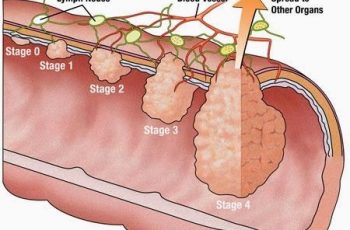
Colon cancer is usually caused by the accumulation of fatty deposits in the intestines
When tumors begin to grow in that part of the body, it is called colorectal cancer. Colon cancer is the third most common cancer in America. It is also the third leading form of cancer, with colon cancer alone killing nearly four hundred thousand people a year.
The large intestine, or large intestine, is where the entire body absorbs water and fiber from digested food. But too much waste build-up in the colon can lead to a build-up of waste. This buildup eventually blocks the colon. The resulting toxins can spread throughout the body, including the heart and brain, and other organs such as the liver, bones, kidneys, and lungs.
There are many symptoms that can indicate colon cancer. These include persistent fever or chills, weight loss or gain, abdominal pain, vomiting, constipation, and diarrhea. There may be chest pain or a lump on the neck. You may also experience unusual bleeding after eating. If you have any of these symptoms, see your doctor immediately.
If the colon becomes enlarged and swollen, bleeding or blood clots may begin. In some cases, the entire colon is affected. This condition can be accompanied by severe abdominal pain, abdominal cramps, diarrhea, and nausea. You may also notice bloating.
Because colon cancer cannot be diagnosed with x-rays, your doctor may choose to have a colposcopy. The procedure involves inserting a camera through a small opening into the anus and vagina. By looking at the colon on film, doctors can see what's going on inside your body.
After the procedure, the doctor will usually give you medication that can be taken to shrink the size of the tumor and stop the bleeding. The surgery may be followed by radiation therapy to kill the remaining cancer cells. Although you may feel uncomfortable during this procedure, the procedure is noninvasive and will not be painful. likely to affect your ability to function normally after the operation.
A few things can trigger a colon cancer. For example, if you have a family history of colon cancer, it is very important to visit your doctor regularly. Eating junk foods, fatty foods, or any foods high in cholesterol are known to increase your risk of colon cancer. Smoking and being overweight are also factors in increasing your risk.
Colon cancer is treatable, but it does not always appear until the late stages of the disease. If left untreated, it can spread throughout the body and affect vital organs like the brain, liver, kidneys, and bones. In this case, you may need surgery, chemotherapy, and radiation therapy to save your life. So, it's important to get regular checkups with your physician to avoid having to deal with this potentially fatal problem.
Some people experience constipation because they do not get enough fiber in their diet. Many times you will find that when you add fiber to your diet, your colon gets the rest it needs to function properly. Fiber aids the colon in absorbing water, thus preventing toxins from building up in the colon. When you don't get enough fiber in your diet, the stool is hard and lumpy and turns black or grey.
If you have colon cancer, it is important to drink plenty of water to flush out the waste products from your body. It is also important to make sure that you have good bowel habits so that you can avoid developing colon cancer again in the future. In order to do this, you need to make sure that your bowels are regularly cleansed, have regular exercises, and get enough rest.
To prevent the possibility of colon cancer from recurring, you should exercise regularly to avoid weight gain and also to avoid becoming obese. Staying away from fatty foods is another way to keep your colon in good health.
It is important that you stay away from colon cleansing products because they may cause your colon to become damaged and have problems with other parts of your body. When you do use them, it is important to consult your doctor to be sure that you are using the best product for your specific situation. If you have any questions about your colon cleansing regimen, contact your physician. Remember to cleanse regularly and always make sure that you eat a healthy diet.
